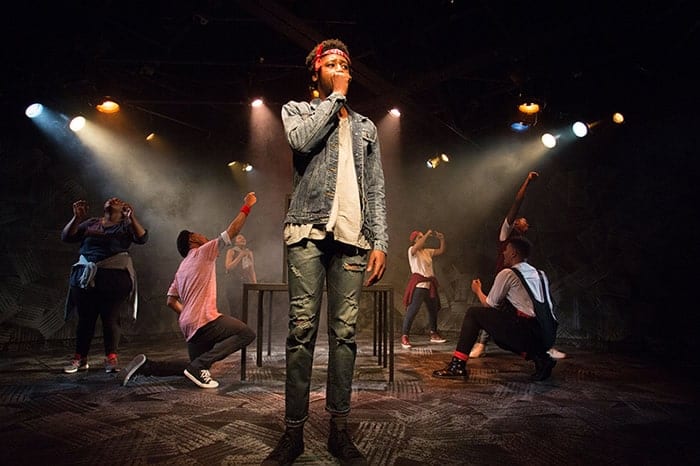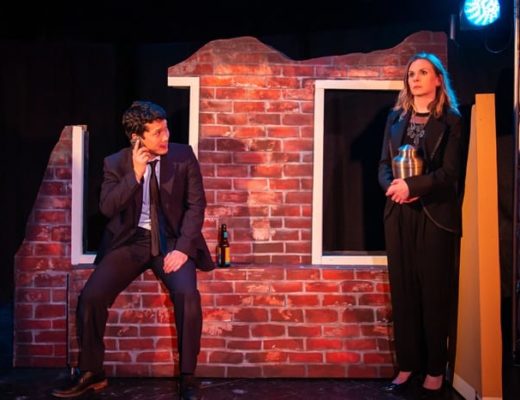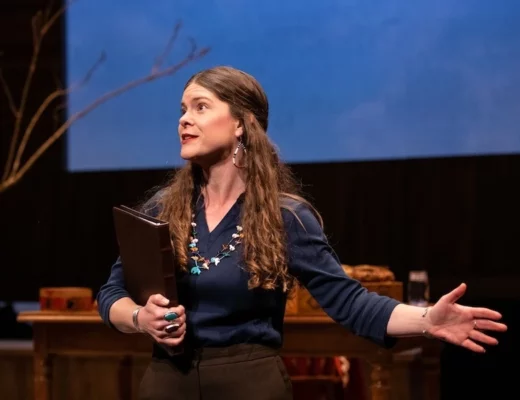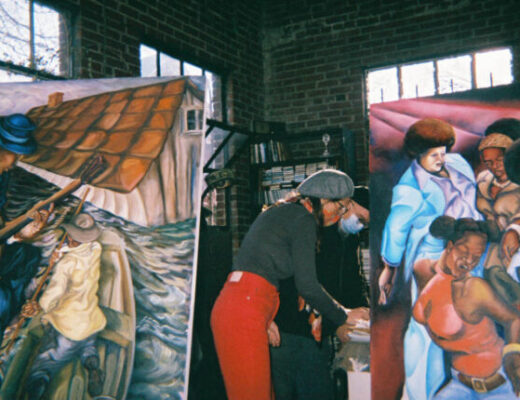by John Bavoso
This article was first published in DC Theatre Scene.
Imagine a large group of college students, surrounded by the international media, anxiously awaiting the moment when a statue depicting a key figure from their country’s racist past is toppled and removed from its place of prominence on their campus. While this scenario has played out recently at the University of Virginia and the University of North Carolina, it also unfolded in 2015 at the University of Cape Town in South Africa—and you can see a vibrant and engrossing retelling of the events in some of the participants’ own words much closer to home in The Fall at Studio Theatre as part of the Studio X program.
When Studio’s Artistic Director, David Muse, saw a production of The Fall—an ensemble piece created and performed by students at UCT’s Baxter Theatre Center under the guidance of drama professor Clare Stopford—at the Edinburgh Fringe, he knew he wanted to bring it to DC. The Fall is deeply personal, rooted in the performers and country that created it, and universally recognizable to Americans of any age and political affiliation.
The inciting incident, as it were, for the events portrayed in The Fall is the moment on March 9, 2015, when UCT student Chumani Maxwele threw a bucket of human excrement onto a statue of Cecil Rhodes, the British Prime Minister of the Cape Colony in the late 1800s and early architect of South Africa’s apartheid system. The statue, despite years of petitions from black students, still stood more than 24 years after the end of apartheid, literally looking down on the UCT campus. Maxwele’s actions helped to inspire the birth of a movement, #RhodesMustFall, and transformed a group of otherwise unrelated students into activists determined to begin the work on decolonizing their campus.
Among those students were Ameera Conrad, Sihle Mnqwazana, Oarabile Ditsele, Sizwesandile Mnisi, Cleo Raatus, Tankiso Mamabolo, and Zandile-Izandi Madliwa, who fill the small stage at Studio with song, dance, spoken word poetry, and accounts of the kind of mistreatment and microaggressions they’ve endured as black students at their university. Driven by the earnestness of young revolutionaries, the ensemble powerfully—and often quite humorously—offers a behind-the-scenes look at the dawning of a movement.
Even united around the singular purpose of tearing down the statue of Rhodes, conflict and divisions within the movement begin to make themselves apparent. Once the statue does fall, the news is filled with images of the male students jumping on the plinth and whipping the statue—much to the chagrin of the radical black feminists in the group, who are sick of being pushed off camera by their hyper-masculine counterparts. And the group’s sole non-binary member has to constantly remind the rest of the characters about the erasure of contributions of queer and transgender individuals to the movement.
The internal debates and dynamics inherent in the early stages of the development of a group of activists is fascinating, but The Fallnever feels like a lecture or reading from a text book. The cast makes the most of the spare space and three plain desks, punctuating their discussions with choreography, beautiful vocals, and live footage from the protests. I began the show scribbling notes in a small notebook, and realized after I had the left the theater that I had quickly given up on my transcription, having become enthralled by a group of truly engaging storytellers.
For those of us past our early 20s, or who have just been paying too much attention to the daily news cycle leading up to the Midterm Elections, the cast’s sense of optimism and utter surety that they can change the world may seem laughably Pollyanna-esque. But if you are willing to really listen and pay attention to how much these young student-activists have already achieved—both personally and politically—you may instead find yourself reenergized and even a little more optimistic about the state of the world and its future after seeing The Fall.
The Fall co-created by Thando Mangcu, Kgomotos Khunoane, Clare Stopford, Ameera Conrad, Sihle Mnqwazana, Oarabile Ditsele, Sizwesandile Mnisi, Cleo Raatus, and Tankiso Mamabolo. Featuring Ameera Conrad, Sihle Mnqwazana, Oarabile Ditsele, Sizwesandile Mnisi, Cleo Raatus, Tankiso Mamabolo, and Zandile-Izandi Madliwa. Stage manager: Puleng B. Mabuya. AEA stage manager: Kelsey Sapp. Lighting designer: Michael Maxwell. Costume designer: Marisa Steenkamp. Scenic designer: Patrick Curtis. Produced by Studio Theatre.





No Comments